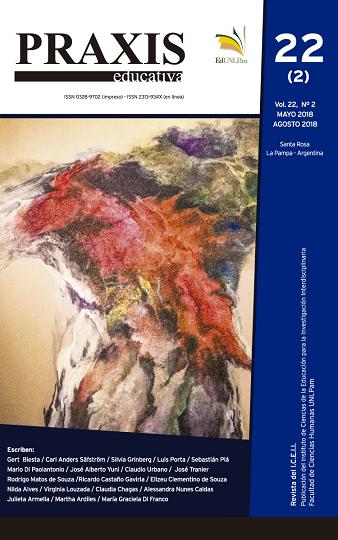Disruptive issues through time: Brief “Ad libitum” genealogy on the margins manifested by schools (Argentina, 1970-2010)
DOI:
https://doi.org/10.19137/praxiseducativa-2018-220210Keywords:
educational issues, borders, new boundaries, school, teaching training.Abstract
The aim of this paper is to address some educational issues regarding some school´s transformations that have irrupted into the scholar field on this specially chosen conjuncture from our Recently History. In order to do this, we will be interested in asking which kind of educational problematics have effectively taken place at school and have also operated as a sort of “before and after” starting point for re thinking daily life at school and the teaching training as well.
Downloads
References
Ascolani, A (Comp.); 2009. El Sistema Educativo en Argentina. Civilidad, derechos y autonomía, dilemas de su desarrollo histórico, Rosario: Laborde Editor.
Biesta, G. y Säfström, C.A. (2011). A Manifiesto for Education. Policy Futures in Education Año. 9 Nº 5, pp.540-547
Bleichmar, S. (2002). Dolor País. Buenos Aires: El Zorzal.
Crespo, J. (2007). Las Maestras de Sarmiento. Buenos Aires: Grupo Abierto Comunicaciones
Deleuze, G.; Guattari, F. (1983). Rizoma. Introducción. Puebla: Premiá.
Duby, G. (1995). Las huellas de nuestros miedos, Buenos Aires: Andrés Bello.
García, N. (2017). La Educación Clandestina. Espiar, colaborar y depurar. Santa Fe (1966-1983). Buenos Aires: Prohistoria.
Grinberg, S. (2006). “Educación y Gubernamentalidad en las sociedades de gerenciamiento”. Revista Argentina De Sociología Año 4 Nº6, pp. 67-87.
Kaufman, C.; Doval, D. (1997). Una Pedagogía de la Renuncia. El Perennialismo en Argentina. Paraná: Cuadernos. Facultad de Ciencias de la Educación. Universidad Nacional de Entre Ríos.
Mignolo, W. (2007). La idea de América Latina. La herida colonial y la opción decolonial. Barcelona: Gedisa.
Young, J. C. (2006). “¿Qué es la crítica Poscolonial?”. Pensam Jurid, Año 5, Nº27, pp. 281-294.
Downloads
Published
Issue
Section
License
Copyright Notice
Editorial Committee Educational Praxis Magazine:
I hereby declare that I am the author of the article titled (article name), that it is original and my own and that it was not previously published in any other format or medium. I declare to know that the magazine will not charge me any type of fee under any circumstances, nor will I receive any type of monetary compensation If it were accepted for publication in Educational Praxis, I authorize the aforementioned magazine to publish it digitally and to advertise it on its social networks.
If the work is published, I adhere to the Creative Commons license called "Attribution - Non-Commercial Share Alike CC BY-NC-SA", through which it is allowed to copy, reproduce, distribute, publicly communicate the work and generate derivative works, as long as when the original author is cited and acknowledged. This license has been used since September 2018. In 2016 CC BY NC ND 4.0 was adhered to; and in the years 2017 and 2018 (January-August) CC BY NC 4.0.
This CC BY-NC-SA Share Alike license does not, however, permit commercial use of the work. As an author, the journal may establish additional agreements for the non-exclusive distribution of the version of the work published in the journal, it allows me to self-archive the published articles, in their post-print version, in institutional, thematic repositories, personal web pages or any other relevant use. with the recognition of having been first published in this journal.
Educational Praxis adheres to DORA (Declaration on Research Assessment) signed in San Francisco, California, on December 16, 2012, and to the Declaration of Mexico (Joint Declaration LATINDEX - REDALYC - CLACSO - IBICT).















_(1)2.png)


3.png)











_(2).png)






2.jpg)









